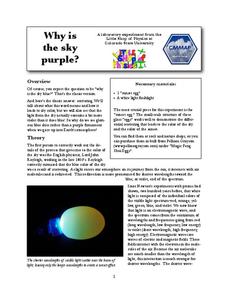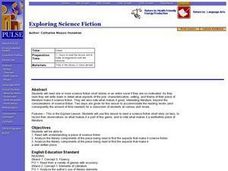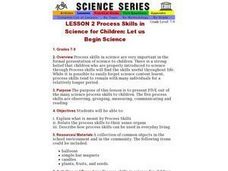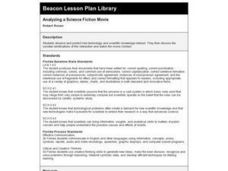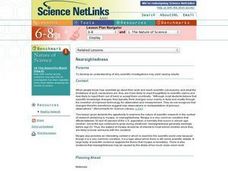Colorado State University
Why Is the Sky Purple?
The color of the sky depends on the time of day. Young scholars experiment with scattering different wavelengths of light to recreate the color of the sky. They observe both the longer blue wavelengths and the shorter red and orange...
Nuffield Foundation
Investigating Factors Affecting the Heart Rate of Daphnia
What variables change heart rate? Young scientists observe the beating heart in Daphnia to understand these variables. They make changes in temperature, chemicals, and other factors as they graph the heart rates. Analysis questions help...
PBS
Student Helioviewer Data Tool
Scholars use current satellite data to view solar events, solar features, and so much more. It allows them to make videos over time to observe patterns and visually understand the sun at a much higher level using the interactive that is...
Acoustical Society of America
Doppler Effect
Here comes the sound. After watching a couple videos demonstrating and explaining the Doppler Effect, learners develop their own understanding of the phenomenon. Scholars draw a sound wave and observe how the perception of the wave...
University of Waikato
Ocean Acidification and Eggshells
Eggshells and seashells have a lot in common. Learners use the similarities to conduct an experiment that models the effect of ocean acidification on marine animals. Using varying levels of acidic liquids, pupils make observations on the...
NASA
Seasonal Science: Building Claims from Evidence
A lot can change in a year! Investigators observe a video of Earth over the course of a year and complete a KWL chart. Astronomers view a second video, participate in a guided discussion, and discuss the rubric for successfully...
Baylor College
Food for Kids
Immediately capture the attention of your class with the smell of freshly popped popcorn in the sixth activity of this series on the needs of living things. Young scientists first use their senses to make and record observations of...
Curated OER
Observing Sound
Second graders study the five senses and the link between pictures and sound. In this sound lesson students discover that sound is vibration, it is described by volume and pitch.
Curated OER
Windbreakers; Earth Science, Topography, Weather
Students consider how topography affects weather and human activity. Students simulate a mountain range and observe surrounding wind patterns.
Curated OER
Fish Identification Skills
Young scholars describe the roles of various organisms in the same environment. They study fish based on thier behavior and features. In addition, they identify fish based on specific characteristics.
Curated OER
Applied Science-Science and Math Post Lab
Students explore magnification. In this science skills observation lesson, students make a hand lens using a wire loop and a small amount of water.
Curated OER
Exploring Science Fiction
Twelfth graders read a variety of science fiction short stories. Using the text, they identify the components that make it science fiction and a well written piece of literature. They record their observations and share them with the...
Curated OER
The Science of Microbes (Observing Different Microbes)
Students use their observation and inquiry skills to understand microbes. In this microbiology lesson, students explore slides with a microscope. Students gain experience with preparing slides and proper use of a microscope while...
Curated OER
LESSON 2 Process Skills in Science for Children: Let us Begin Science
Students study five process skills used in learning science and how they can be used in daily life.
Curated OER
Analyzing a Science Fiction Movie
Fourth graders watch the movie "Contact" and write a review. They discuss in their review how scientists deal with technological problems, the movie's connections to the nature of science and how technology affects science. They share...
Curated OER
Environmental Studies: The Environment Rocks!
Rock exploration, so exciting! After reading the book Everybody Needs a Rock, the class makes sandwiches to better understand that the Earth is made in layers. They then use a description of the 3 types of rock to conduct an observation...
Curated OER
Nearsightedness
Examine the processes scientists go through to develop their conclusions. Using the internet, research the problem of nearsightedness and identify anyone they know with the condition. Discover the debate in the science world on this...
Curated OER
Water and Ice
Students observe and discuss what happens when water turns to ice and when ice turns into water. In this freezing and melting lesson plan, students observe ice and water and complete hands on activities that change their properties.
Curated OER
Animal Research Pamphlet
Fourth graders perform research on an animal of choice. The reading of a novel is done prior to the research in order to establish context for the lesson. The use of the library for research is a key skill for this lesson.
Curated OER
Seasons Worksheet #2
A tilted Earth is shown in relation to the rays of light from the sun. Earth science superstars determine latitude, month, and time of day. They compare number of daylight hours for different points on Earth. The five multiple choice...
Curated OER
Fish Tank Territories
Students observe swimming and resting patterns of aquarium fish to determine how different parts of the habitat are used. Different pairs of students should compare their results after several days to look for daily patterns.
Curated OER
Making Regolith
You may not be able to take a field trip to the moon, but that doesn't mean your class can't study moon rocks. Using graham crackers as the moon's bedrock and powdered donuts as micrometeorites, young scientists simulate the creation of...
Curated OER
What are Igneous Rocks and How are They Formed?
Crystals form before your very eyes! What sixth grader wouldn't enjoy this lesson plan on igneous rock formation? Using hot Salol, junior geologists observe the crystal formation process as the material cools. This comprehensive lesson...
Curated OER
Eggs'ceptional Experiments
Young scholars see evidence of chemical reaction and follow the scientific method to hypothesize, observe, and reach conclusions. They conduct a series of egg based experiments such as forming crystals and complete journal activities as...


